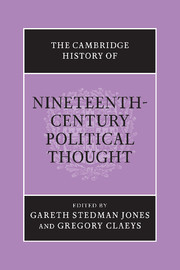Book contents
- Frontmatter
- Contents
- Contributors
- Acknowledgements
- Introduction
- I Political thought after the French Revolution
- II Modern liberty and its defenders
- III Modern liberty and its critics
- IV Secularity, reform and modernity
- 18 Church and state: the problem of authority
- 19 The politics of nature
- 20 Conservative political thought from the revolutions of 1848 until the fin de siècle
- 21 Modern liberty redefined
- 22 Political economy
- 23 German socialism and social democracy 1860 –1900
- 24 Russian political thought of the nineteenth century
- 25 European political thought and the wider world during the nineteenth century
- 26 Empire and imperialism
- Epilogue
- Biographies
- Bibliography
- Index
18 - Church and state: the problem of authority
from IV - Secularity, reform and modernity
Published online by Cambridge University Press: 28 July 2011
- Frontmatter
- Contents
- Contributors
- Acknowledgements
- Introduction
- I Political thought after the French Revolution
- II Modern liberty and its defenders
- III Modern liberty and its critics
- IV Secularity, reform and modernity
- 18 Church and state: the problem of authority
- 19 The politics of nature
- 20 Conservative political thought from the revolutions of 1848 until the fin de siècle
- 21 Modern liberty redefined
- 22 Political economy
- 23 German socialism and social democracy 1860 –1900
- 24 Russian political thought of the nineteenth century
- 25 European political thought and the wider world during the nineteenth century
- 26 Empire and imperialism
- Epilogue
- Biographies
- Bibliography
- Index
Summary
The history of thinking about the structures of human association in Western Europe during the nineteenth century was marked by a remarkable resurgence of interest in questions pertaining to the conflicting and mediating relations between the spiritual and temporal, the transcendent and immanent, the sacred and secular dimensions of human experience, as well as to the institutional, ‘objective’ articulation of such ‘subjectively’ defined relations in the renegotiations, transformations, reforms and reconstructions of the relations between state and church. Between the defeat of Napoleon and the massive social and political transformations of the last quarter of the century, it was virtually impossible to formulate questions concerning the associative life of human beings outside the framework of the field of tension and reciprocity produced by religious and political agendas for transforming emancipated strangers into members of a community of consciousness, will and sentiment. It is difficult to find a significant political or social thinker before 1870 whose discourse was not framed in large parts by this polarity.
- Type
- Chapter
- Information
- The Cambridge History of Nineteenth-Century Political Thought , pp. 603 - 648Publisher: Cambridge University PressPrint publication year: 2011
- 1
- Cited by



